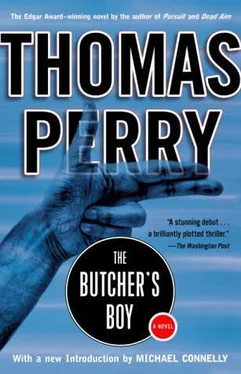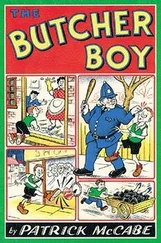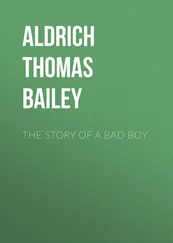It was Eddie who’d taught him about rest. Eddie had been the undefeated world champion of resting. He could still hear the quiet, patient voice: “Never work when you’re tired, kid. You have to be able to think straight, and you have to have the physical edge too. Each time it’s a contest and if you don’t come in first place every time you’re dead.” Eddie Mastrewski had kept the physical edge all right. That frigid winter night in Philadelphia when the building contractor had spotted them on the street and tried to run away he’d seen it. All his mind had told him was that they couldn’t shoot, and so he was paralyzed for a minute. But Eddie had just muttered “Oh, shit,” reached over the seat to the back of the car, and taken off on foot after the contractor with the tire chain. He ran him down and garrotted him.
But Eddie’d had the build for it, he thought. A Pennsylvania Polack from the coal mining country—probably the toughest physical specimens on earth except for maybe central Asian goatherds who were supposed to live to be a hundred and forty. He could hear Eddie correcting him, “I’m not a Pole, I’m a Lithuanian. There’s a difference, kid. I just don’t know what it is.” But Eddie had sure known how to sleep. He seemed to sleep whenever there wasn’t some definite reason why he shouldn’t. Even then Eddie seemed a little resentful and suspicious that the reason might not be good enough. He’d seen Eddie sleep on trains, buses, and airplanes; in stations and sitting up behind the wheel of a parked car. Over the years he’d learned that there was something to Eddie’s theory. Sleep really did make a difference. Maybe Eddie hadn’t had enough sleep the day he got it. Or maybe when you got to a certain age there just wasn’t enough sleep to make up for all the years.
He put on the sport coat he’d bought in the hotel store this afternoon, took another look at the knot in his tie, closed his door, and began to walk down the hall toward the elevator. Then he hesitated. No, he thought, it’s stupid not to. He returned to the room, bent over, and pulled a few tufts of lint from the bright azure carpet. He stuffed them between the door and the jamb about two inches above the surface of the red carpet of the hallway. It’s always better to know than to wonder, he thought as he stepped into the elevator.
He made his way through the crowds and noise of the casino and out to the front entrance. The doors gave a wheezy sigh and opened automatically to pull him forward into the warm night air. The absurd magnificence of the oversized fountain along the drive seemed to be the focus of the unanimous eyeless contemplation of the genuine Carrara marble copies of classical statues that stood sentinel. Sammy Cohen had once called them The Stupefied Losers, but that wasn’t what they looked like. It was as though they were staring in dumb amazement at waking up and finding themselves so far from the gentle, reasonable proportions of home.
He glanced at the line of taxis waiting in the loop, but dismissed them in favor of the stroll. There were hundreds of people walking up and down the sidewalks of the Strip in light summer clothing that changed colors as they passed under the garish incandescent auras of the gigantic marquees and glittering facades of the casinos. He stepped in among them, into a herd that was flowing along in the direction of the Sands. As they passed each doorway, came into the glowing circle of each new complex of lights and neon signs, a portion of the herd would be drawn off by the magnetism of it. Others would issue forth from the doors to replace them.
They were moving toward the center of the city, and as they did the white river of automobile traffic in the street seemed to slow down and constrict, the signs and lights to cluster together more tightly into a general undifferentiated blur and dazzle, until the doorways were just holes in the light.
Then there was a pause in the glitter, as though it were gathering itself up for some major effort, and then the monolithic marquee of the Sands burst forth to dominate the night. He peeled himself out of the moving crowd, walked up the steps, and crossed the boundary into the air-conditioned cool of the casino. Inside the light, the air, the colors, the sounds were all different and belonged to the special exigencies of this place, where the world consisted of a low-frequency hum of unflagging agitation, like an itch or a hope.
He made one slow circuit of the casino, past the banks of winking, buzzing, clattering slot machines that spun gyroscopically on the periphery, then past the zone of roulette wheels and crap tables and along the rank of fan-shaped blackjack games ascending in order of wealth toward the roped-off sanctum of high-stakes baccarat, where the croupiers wore black tuxedos and the reverential faces of French financial consultants.
Little Norman wasn’t in evidence in the casino, but he knew that someone would tell him. One of the unseen beings Norman kept on his personal payroll would probably be talking into a telephone right now. He made a leisurely path to the doorway of the Regency Room and slipped through the doors into the candlelit red-and-gold silence. He always had the sense that this place was insulated from the cacophony of the city by something more than walls, as though everything outside could explode into screaming atoms and you’d never know it by so much as the wavering of a candle flame. The maitre d’ conducted him to a booth in the far corner of the room, where a waiter nodded his respect for the wisdom of beef Wellington and a middle-range Bordeaux with two glasses.
He had almost finished the beef Wellington when Little Norman came in and sat down at his table. “Hello, kid,” said Little Norman. “You come over here looking for me?”
“That’s right, Norman. I thought I’d take you up on that drink. I suppose you’ve already had dinner?”
“Yeah, but since you got an extra glass I’ll help you with the wine.” Norman poured it himself, sniffed the bouquet, and said, “Not bad at all. Your idea or the waiter’s?”
“Mine,” he said and kept eating.
“Then you’ve picked up a lot since you worked with old Eddie. I always heard that travel broadens you.” He chuckled.
“I’ve always heard that too.”
“Something on your mind, kid? You’re not looking too cheerful. I mean besides the thumps on your face.”
“I’m fine. Nothing wrong that a few days of rest won’t handle. How about you, Norman? You have a hard day? Run into anybody that was nervous about anything?”
“No,” said Little Norman, and smiled. “I ran into one or two who used to be nervous, but I seem to have a natural talent for reassuring people. Should have been a psychiatrist, I guess. I’d probably have a lot more money.”
He eyed the heavy gold ring on the finger Norman had wrapped around the stem of the glass. The diamond, he calculated, was around five carats. It looked big even on Little Norman. “I doubt it,” he said.
“I guess you’re right,” said Little Norman. “White folks don’t want a big black psychiatrist, and black folks don’t have the money for one. They just have to stay crazy, like I did, and learn to enjoy it.”
He pushed his plate away and noticed that Little Norman had emptied the bottle. “Well, how about that drink, Norman? You want it here, or you want to go someplace else?”
Little Norman leaned back in his chair to let the waiter deposit the check where the plate had been. He paused to savor the last inch of wine in his glass, then said, “You know, I think you’ve been working too hard. Seems to me like you’re in a hurry all the time, like you forgot how to relax. I’m gonna have to take pity on you and remind you how it’s done.” He waited while the waiter whisked the money away. Then he stood up and said, “No sense in being crazy if you’re not gonna enjoy it.”
Читать дальше












